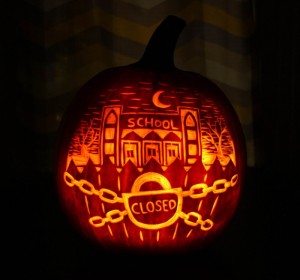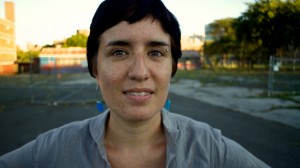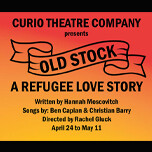On first glance, Milena Velis’s carved pumpkin seems out of place.
A thick, padlocked chain marks an X in front of a fence. In the distance, the moon rises above a school building framed by bare, gangly trees.
It’s an image in stark contrast to the werewolf, skeletons, pumpkin heads, and haunted forest that comprised the entries in West Philly Local’s 2013 Pumpkin Carving Contest. But while Velis’s pumpkin may not show a spooky motif synonymous with Halloween, it could be considered the most frightening of them all.
After all, what’s more terrifying than the School District of Philadelphia shuttering 24 schools—including local University City High School and Alexander Wilson Elementary—and laying off nearly 3,000 staff members in the face of steep budget cuts and choked funding?
The chilling implications of the public education crisis on Philadelphia and its families is largely why Velis’s pumpkin, which took two days to design and nearly three days to carve, won Readers’ Choice in the contest. To the many West Philly Local readers who voted, her pumpkin symbolized the “scariest thing” to happen to Philadelphia this year. Velis said this was her intention with her Scariest Pumpkin category entry—to memorialize what happened at the beginning of the school year.
“Part of it is just that there’s something so unbelievable about the permanent closing of schools that it does take a while to process it. That’s true for a lot of people,” Velis, a 29-year-old Cedar Park resident, told West Philly Local.
 The forlorn image Velis sketched out to signify the citywide closings—the first wave of a multi-year plan that would see the shuttering of 64 schools by 2017—was inspired by the closed facilities in her neighborhood and near the Media Mobilizing Project (MMP) office at 43rd and Chestnut Streets where she works. To Velis, those now-deserted buildings, surrounded by plants breaking through asphalt, are similar to haunted houses: once bustling institutions dispensing education on impressionable minds are now abandoned cenotaphs forever haunted by its past.
The forlorn image Velis sketched out to signify the citywide closings—the first wave of a multi-year plan that would see the shuttering of 64 schools by 2017—was inspired by the closed facilities in her neighborhood and near the Media Mobilizing Project (MMP) office at 43rd and Chestnut Streets where she works. To Velis, those now-deserted buildings, surrounded by plants breaking through asphalt, are similar to haunted houses: once bustling institutions dispensing education on impressionable minds are now abandoned cenotaphs forever haunted by its past.
“Every year, there may be battles about funding or staffing levels, but this year has raised the stakes and really made people think about what the future is going to be for public education in the city as a whole,” Velis said. “It raised the stakes because it doesn’t seem guaranteed anymore. Public education seems like something that we actually have to fight, for its continued existence.”
As a media production coordinator for MMP, Velis works with the many parents, teachers, activists and community organizations fighting back against the School District’s austerity measures—fighting for a student’s right “to be in a good school, to get a good education, to not worry about your school being closed or teachers getting cut.” (After submitting her “Scary Philly Schools” pumpkin, Velis said she wished she could have carved one symbolizing such activism, which is documented in the “Our Schools Are Not For Sale” MMP video short.) Her on-the-ground work in education and social justice exposed her first hand to the impact the closings have had on communities and the scariest part, she said, is “seeing how much we’re kind of experimenting on kids right now. We’re throwing them into situations that have not been planned for.
“There hasn’t really been a plan for how you bring in 400 new students into a school that already has budget problems,” said Velis. “How do you shuffle around the teachers? How do you shuffle around all the resources with no counselors? It really does feel like an experiment on kids as they’re trying to get their education and trying to just go to school and get ahead.”
In the end, Milena hopes that her pumpkin will embolden community members, whether affected indirectly, directly, or not at all, to discuss the education watershed despite it being seen often as a “political” issue. “Sometimes people don’t want to talk about ‘politics’, but we should be having conversations about the things that are happening in our communities that are gonna have repercussions of the long-term for our families,” Milena stressed.
And hopefully, she added, that rise in conversation will encourage those families living in its aftershock—and dealing with the impact on their own—to become a part of the dialogue.
“Not everyone has a way to really communicate what the affect has been,” she said. “[This could help them] to actually raise their voices, to make their voices heard about what matters to them.”
–Annamarya Scaccia







November 14th, 2013 at 2:32 pm
fantastic. mmp tells stories through every possible medium!